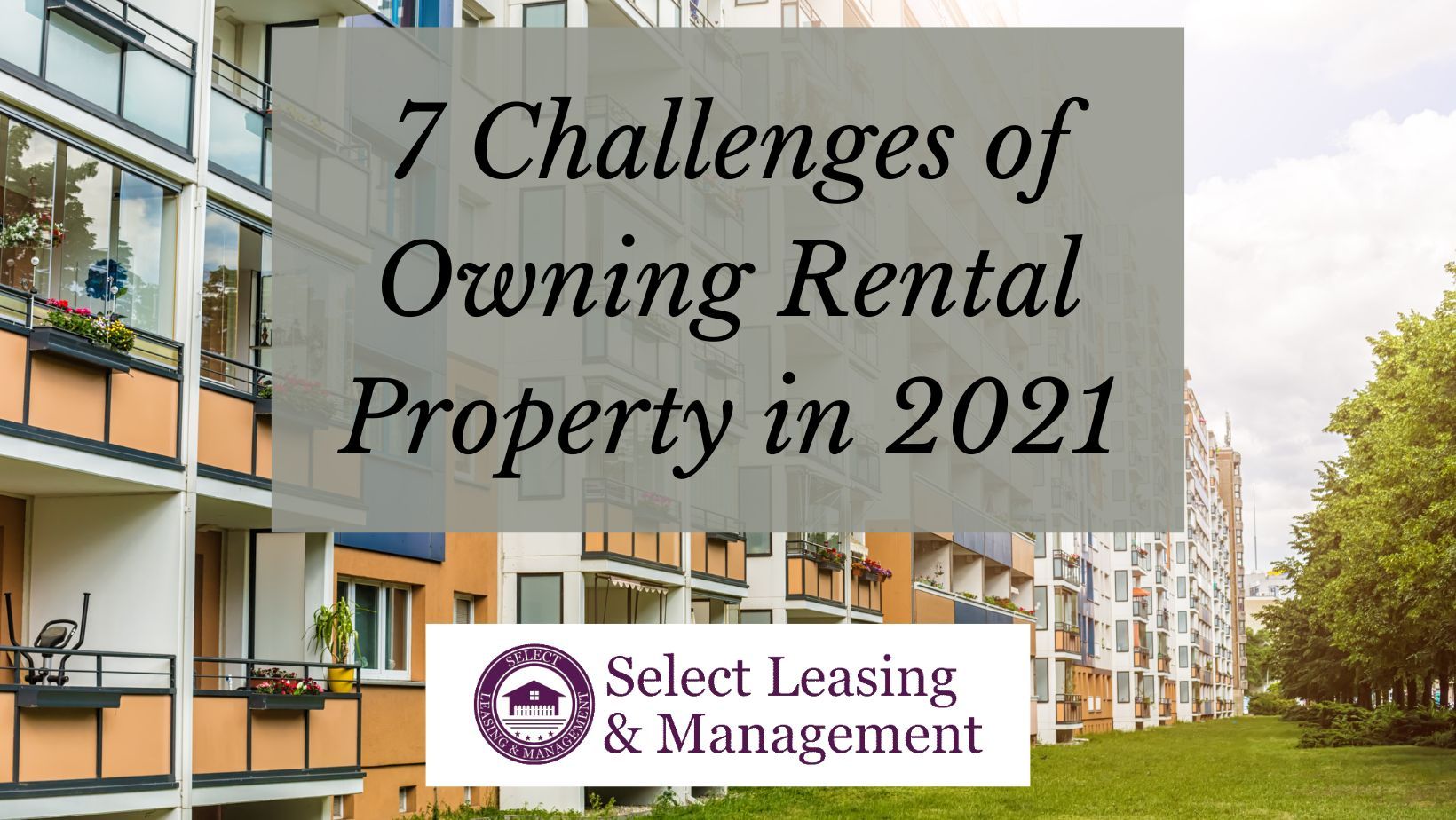7 Challenges of Owning Rental Property in 2021

1. Meeting Renter’s Requirements
Remote work and stay-at-home orders have people spending more time under their rented roofs than ever. It doesn’t take long for a tenant to learn what they love—and hate—about their living space.
One challenge for property owners in 2021 is tenants’ increased demand for amenities, convenience, and a specific type of property. Renters are seeking out larger apartments and single-family homes to give their family the space it needs to work, attend school online, and relax at the end of the day.
Obviously, there’s little a landlord can do about the size of a rental property they already own. But if they’re considering adding to their portfolio, it’s a good thing to keep common tenant concerns in mind. In 2021, expect renters to look for places with home office space, more amenities like higher-end kitchens, and in-unit laundry hookups. Being near a gym or restaurants may be less important than an on-site exercise space and nearby grocery store.
2. Not Your Typical Tenants
In 2021, landlords may have to rethink how they look at prospective tenants. Many more applicants may be self-employed or part of the gig economy. For the first time, they may be getting interest from people who were evicted due to job loss during the pandemic.
Background checks are as important as they always have been, but traditional screening might not tell the whole story. For example, was an applicant’s eviction based on non-payment after years of being an excellent tenant? Did their bad payment history correspond to losing a job after several years of steady employment? There is a difference between someone getting back on their feet after a stretch of bad luck and a truly bad tenant.
Listening to a prospective tenant’s story with an open mind can help a landlord find good tenants whom they may have overlooked in the past. They may also want to start requesting character references in addition to the usual forms. It’s also important to learn how to verify self-employment details. Landlords must also be careful when turning down an applicant. For example, some cities or states may prohibit rejecting tenants based on the source of their income. Turning away someone who receives government assistance might be illegal during the pandemic.
3. Making the Mortgage While There’s a Moratorium on Evictions
At the time we’re writing this, there’s a federal moratorium on evictions until the end of 2020. There’s no telling how long this could last, or if some states will pick up with it once the federal government lifts the ban. This is welcome news for renters who may have lost their ability to keep up with rent during the pandemic.
Unfortunately, what’s lacking is federal financial relief for those owning a rental property. Most states, however, are offering some form of grants and other protections to help landlords.
The challenge in 2021 for many landlords will be figuring out ways to pay the mortgage if they can’t collect rent. The good news is that this is just a pause of evictions. Once lifted, landlords will be able to demand back rent from tenants. At that point, expect a flood of evictions hitting the courts. Landlords will then need to come up with the resources to serve those evictions.
It’s important to note that renters are expected to make partial payments in order to be protected by the moratorium. And landlords can still evict people guilty of other violations such as destruction of property or illegal behavior.
4. Unpredictable Rental Rates
If they’ve lost money in 2020, landlords may be tempted to increase rents by a greater than normal amount in 2021 to make up for it. A spike in rent could be a bad idea for a couple of reasons.
First, the landlord must consider the local housing market. If the rent was hard to collect in 2020, overpricing the unit compared to similar offerings won’t help. And remember, an apartment collecting a lower rent is better than one that’s vacant.
There may also be temporary local or state regulations on raising the rent, even if there is an annual increase written into a lease. It is best to check on the rules for possible rent freezes in the local market before announcing an increase.
5. Flexibility on Regulations
In 2021, property owners should be ready to lift or ease some of the restrictions that are written into their leases. People everywhere have had to adjust their lifestyles due to the pandemic and the economic turmoil it’s caused.
In order to keep good tenants who are able to pay their rent, landlords may want to reconsider their stance on certain rules. For example, a tenant may want to add a roommate to the lease agreement to help with living expenses. Or, they may need to move out. The landlord could consider a sublease, even if they typically wouldn’t. Switching to a short-term or month-to-month lease could give a tenant incentive to stay. It will keep rent rolling in for the time being, rather than insisting on a long lease that could force a tenant to move.
Coming to an agreement with a good tenant is a chance to build a good relationship, which could ensure that they continue to rent for years to come.
6. More Technology Than Ever
Online services will be essential in 2021. Many landlords already offer automatic electronic rent collection and online maintenance requests. If they don’t, now is the time to get these technologies set up. Due to COVID-19, doing business without face-to-face contact is more important than ever before. It’s safer, quicker, and easier for both tenants and landlords.
The pandemic has also made viewing apartments online more common. Virtual video tours and a lot of online photos can attract new tenants. The need to make an appointment to view an apartment in person may bring only the most interested applicants, saving landlords time and reducing their exposure to the virus.
Filling out applications online is already common in some markets, but expect it to become the norm in 2021.
As for rental houses and units themselves, tenants will be looking for high-speed internet, for work, school, and streaming services. Landlords might want to invest in upgrading their technology in 2021 to anticipate the growing need.
7. Tenant Safety and Security
Safety and security are always a top item on the list of tenant concerns. Good locks, intercoms, and lighting are important for everyone’s personal security. That will be true in 2021 too—with a few new twists.
Due to the pandemic, tenants will expect more extensive cleaning and sanitizing in shared areas of the property such as the lobby or laundry room.
Finally, some larger buildings are taking steps to revamp their lobby areas to accommodate the increase in food, grocery, and package deliveries. Some are installing parcel delivery lockers for each tenant as a safe and secure way to get their online orders.
Be Prepared for the Unexpected
This year has had more uncertainty than any in recent history. Our best advice for those owning rental property is to keep an open mind and stay flexible in 2021. It’s unclear how long it will take to get the pandemic under control and for the economy to bounce back.
That said, we still see rental real estate as a worthwhile investment for those who can stay the course. Times might be tough right now, but there will always be good tenants out there who need reliable landlords. If you would like to discuss ways to get help managing your rental property challenges, Select Leasing and Management would love to hear from you.
Cover image by querbeet by Canva.com
Share this post











